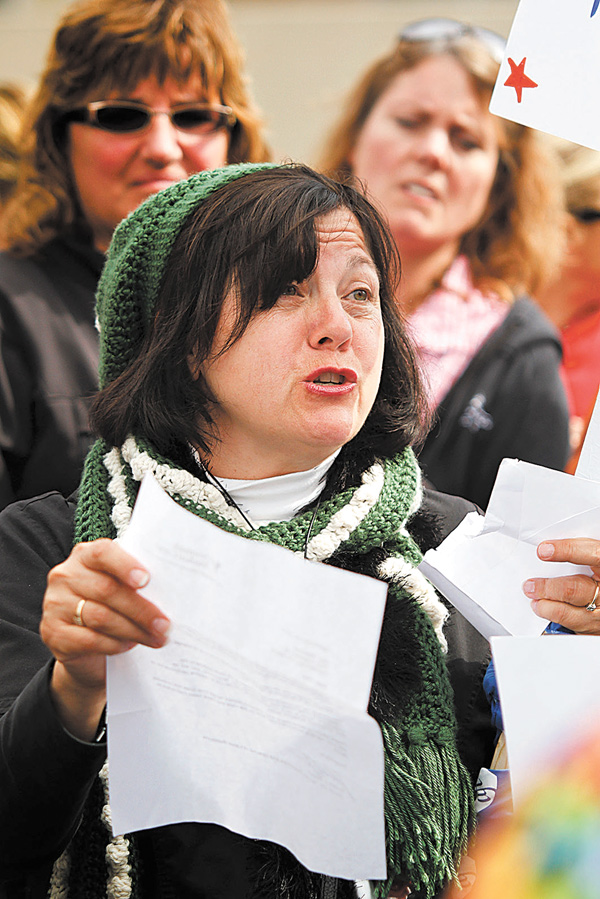

Thursday, September 26, 2013

Jean Mulichak, a registered nurse, shows the letter she received after being locked out of ValleyCare Northside Medical Center for participating in the nurses’ one-day strike.
YOUNGSTOWN
Many of the registered nurses who conducted a one-day strike Tuesday against ValleyCare Northside Medical Center were back on the job Wednesday, but others remained locked out.
Nurses are planning to gather at 7 a.m. Monday and try to go to work.
The hospital says it is not locking out nurses.
If that’s true, then all registered nurses should be able to go back to their jobs, said Eric Williams, president of the Youngstown General Duty Nurses Association. The YGDNA represents about 485 registered nurses at the hospital.
Nurses who were not scheduled to work during the strike were allowed to return to work at 7 a.m. Wednesday.
Others who struck when they were scheduled to work were locked out Wednesday, said Williams.
Williams described the lockout as “selective” because some nurses had not, as of Wednesday morning, received back-to-work information from the hospital.
The hospital hired replacement nurses for a 72-hour period, the minimum commitment required, said Trish Hrina, vice president of marketing and public relations at Northside.
As a result of that commitment, said Kirk Ray, Northside chief executive officer, in a letter Wednesday to employees, Northside nurses who went on strike will return for their next assignment after the 72 hours have ended.
“We look forward to welcoming all of our nurses at that time,” he said.
“The hospital’s ‘72-hour commitment’ to the out-of-state replacement nurses is another example that Kirk Ray and his Tennessee bosses aren’t interested in a commitment to Youngstown nurses,” Williams said. “There are hundreds of locked out Youngstown nurses who are ready and willing to work and provide quality, safe patient care.”
The Northside registered nurses, who have worked without a contract since July 2012, conducted what the YGDNA called an “unfair labor practices” strike from 7 a.m. to 7 p.m. Tuesday.
Registered nurses at Northside haven’t had an across-the-board wage increase in eight years. Nurses start at $23.94 an hour.
The top wage is $29.88, the YGDNA reported.
In a hospital statement Wednesday, Hrina said Northside is continuing operations without interruption. All caregivers — physicians, employees and temporary replacement nurses — are providing high-quality patient care, she said.
Kelly Trautner, the Ohio Nurses Association’s deputy executive officer for labor relations, said the union “fully expects all of our nurses to come into work ... when they are called back.”
The American Federation of Teachers is the national union with which the ONA is affiliated. The state nurses association is the official bargaining agent for the Northside nurses.
Trautner said that as of Wednesday, union officials had not been allowed into the hospital, and were told they would not be until Saturday, to monitor work conditions for their members.
Because of that, she said the ONA planned to file charges with the National Labor Relations Board against Northside for refusing the union access to its working members, and for a discriminatory lock out for participating in a protected activity.
Meanwhile, Northside nurses, while no longer on strike but not yet returned to work, continued informational picketing Wednesday in front of the hospital on Gypsy Lane.
Hrina said the hospital is negotiating in good faith and offered as proof that five of six collective-bargaining units at ValleyCare hospitals have ratified contracts, which mirror the terms it has offered the ONA.
Also, she said there is nothing in the final offer that would inhibit a nurse’s ability to advocate for patients.
The YGDNA contends, however, that the hospital’s offer does not contain specific language giving nurses a voice in patient care. It also objects to staffing language in the hospital’s offer that would enable to send nurses home based on patient counts.